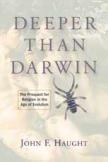God Revealing, A World Becoming
A recent poll of the 1,800 members of the National Academy of Sciences found that over 90 percent profess to being atheists or agnostics. To these learned people, the idea of God and the corresponding sense that we live in a meaningful universe is contrary to scientific understanding. The combination of chance events operating within the laws of nature over eons of time has produced the world as it is, and that is all there is to it. John F. Haught, professor of theology at Georgetown University, both respects the integrity of scientific method and assumes the fundamental correctness of its evolutionary view of the universe and of life upon earth. In fact he chides theologians for still operating in a static universe, ignoring the fact that the world is in becoming. One reason why scientifically educated people today have little interest in formal religion is the failure of theology to integrate the revelatory experience of a personal God into an expansive cosmological setting. At the same time, Haught disputes the materialist belief that science itself offers a satisfactory explanation of life and its meaning. Reality cannot be reduced to what can be caught in the scientific net.
In his previous acclaimed book, God After Darwin (2001), Haught made the case that religious belief is wholly compatible with evolutionary biology. In fact, faith benefits from the encounter with Darwin’s dangerous idea, which enlarges the dazzling length, width, height and breadth of the creative and providential God, compassionate Love who lures life into being. Now, in Deeper Than Darwin, he advances his case by arguing that at their best, the religions of the world hold the key to the most profound truth about the meaning of it all. They do so by claiming that ultimately the universe makes sense and that despite suffering, evil and death, there is reason to hope. Evolutionary biology may see religion as no more than an adaptation needed for consolation and thus survival in hard times. But Haught interprets religion as an adventure of the human spirit, a great, passionate adventure rising up from the universe itself and bearing the world’s deepest truth. Carrying on the ancient tradition of apologetics, this book defends the legitimacy of faith in the face of scientific skepticism by giving reasons for the hope that is in us.
This is an apologetics without rancor. It sees science and religion as different “reading levels” of the same universe, on the analogy of different levels of reading a book. Not necessarily incompatible, both can be truthful ways of reading life’s story. In respectful, vigorous dispute with such noted scientists as Stephen Jay Gould and Richard Dawkins and their texts, Haught establishes that science and religion occupy logically different levels of explanation. He argues with equal verve against Christian proponents of intelligent design theory. These thinkers, too, avoid the depth of nature by latching onto superficial examples of design in the present and overlooking the dark and tragic depths of nature’s evolutionary creativity. Carving a path down the middle, Haught sets out a way of reading the story of nature’s evolution consistent with science and religious hope.
We find ourselves in the midst of a work in progress, whose dynamism to date has yielded increased complexity and beauty. This narrative of immense cosmic unfolding characterized by contingency, law and deep time contains deep wells of surprise. Nature is seeded with promise. Its evolutionary story bears a raw openness to the future. This makes human hope the most realistic of outlooks. Genuinely new things emerge. Streams of biblical tradition give voice to this truth. The promise to Abraham and Sarah despite their old age and sterility; the promise of new life arising in the disaster of Jesus’ death; the promise of a fulfilled creation whose beauty “eye has not seen nor ear heard...”—these immerse us in hope and open us to an unimaginable future. The very bedrock of this hope is the conviction that “nothing is impossible with God”—God who is not the world but is the origin and goal of all that is, God who is the wellspring of novelty. Instead of dictating to or controlling the unfinished world, divine actions flow from divine humility. Biblical faith bears witness to encounter with God who is liberating, self-sacrificing, suffering, full of love and faithfulness. When the faith community says “God,” they are referring to the one who makes all things new. Thus we do not need to choose between an impersonal universe with no point (scientific materialism) or a dwarfish personal God (intelligent design theory), but can see the evolution of the cosmos as an extravagantly sacramental expression of a transcendent, personal, divine power always opening up a future for the world.
This is a beautifully written, deeply intelligent and much-needed book. I lingered over almost every page, savoring the turns of argument and inspiring insights, always conveyed in clear prose. There is something endearing in the way what Haught knows of God in his own faith experience as a believer shines through the rigor of his reasoning. The community of believers is in his debt for taking the insights and challenges of contemporary science seriously and grappling urgently with how to articulate faith in this context. The surprise comes in how this effort discloses in a new way the hidden God who abides in the world most intimately in the mode of promise.
This article also appeared in print, under the headline “God Revealing, A World Becoming,” in the November 17, 2003, issue.








